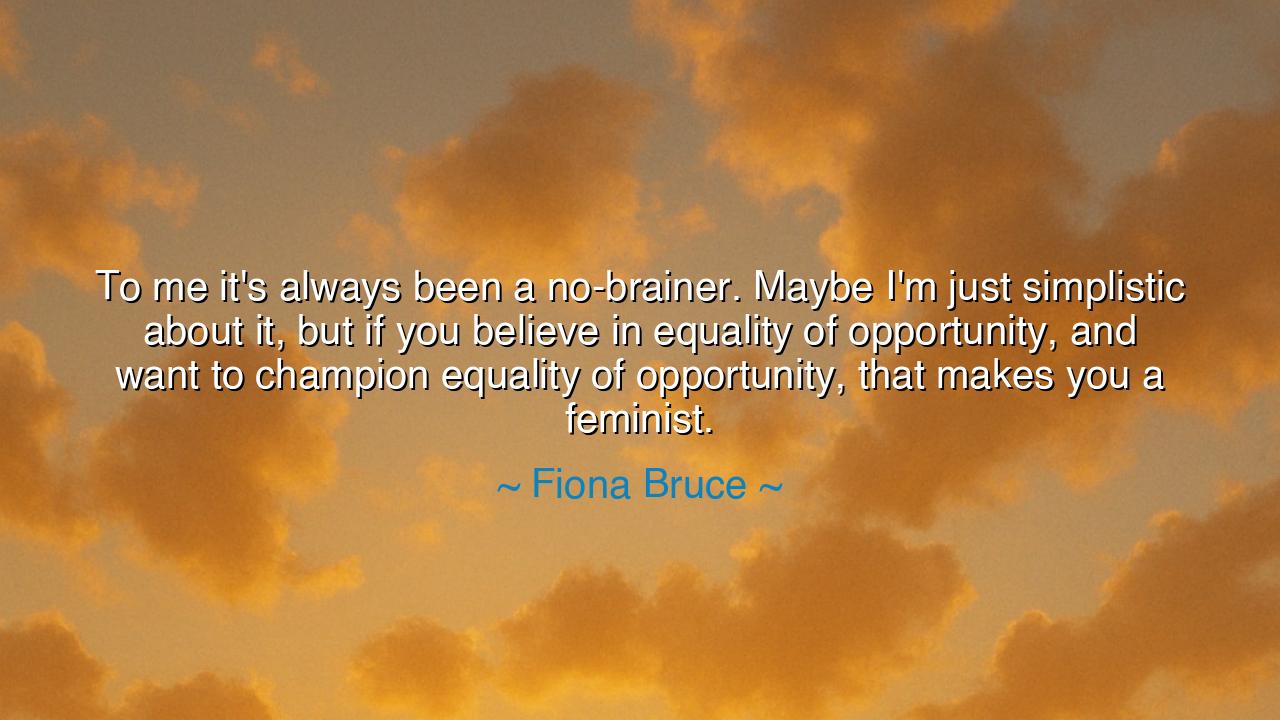
To me it's always been a no-brainer. Maybe I'm just simplistic
To me it's always been a no-brainer. Maybe I'm just simplistic about it, but if you believe in equality of opportunity, and want to champion equality of opportunity, that makes you a feminist.






In the vast and ancient arc of human history, where the fight for justice and equality has long been waged, the words of Fiona Bruce strike a chord that reverberates with clarity and purpose: "To me it's always been a no-brainer. Maybe I'm just simplistic about it, but if you believe in equality of opportunity, and want to champion equality of opportunity, that makes you a feminist." In these few words lies a profound truth: the essence of feminism is not an abstract ideology but a deeply human belief in fairness, equality, and the unyielding pursuit of a world where every individual, regardless of gender, has the opportunity to thrive.
The ancients too grappled with the question of equality. In the Greek city-states, the ideal of democracy was championed, but its fruits were reserved for free men—women, slaves, and foreigners were excluded from the rights and opportunities granted to citizens. Socrates, one of the greatest philosophers of ancient Athens, argued that truth and wisdom were not bound by gender or status, yet the society in which he lived could not fully realize the implications of such a belief. The women of ancient Greece were largely relegated to the private sphere, unable to partake fully in the public life of their city. Even in the most enlightened of societies, opportunity was limited by arbitrary social constructs, where one's birth, gender, and role in society determined the extent to which one could participate in the shaping of the world.
In the modern era, Fiona Bruce’s words bring us back to the simplest of truths: feminism is not about some grand, abstract mission, but about the fundamental belief in the equality of opportunity for all. It is the realization that every person, regardless of their gender, deserves the chance to chart their own path, free from the limits imposed by outdated, unjust systems. This is the very heart of feminism—not the pursuit of power over others, but the removal of barriers that hinder growth and potential. Bruce’s statement simplifies a complex issue into its core: if you believe that everyone deserves equal chances, then you are, by definition, a feminist.
Throughout the history of women's rights, the fight for equality of opportunity has been a long and arduous one. Susan B. Anthony, a leader of the women's suffrage movement in the United States, devoted her life to ensuring that women could participate fully in the political life of the nation. At the time, the idea of women voting was as radical as it was revolutionary. Anthony believed that the right to vote was fundamental to ensuring that women could achieve the same opportunities as men in society. Her fight was not for some abstract notion of gender power but for the simple right to participate in a system that affected her life and the lives of millions of other women. By advocating for equality of opportunity, she was embracing the core principles of feminism that Bruce so succinctly describes: the belief that everyone, regardless of their gender, should be allowed to pursue their dreams and ambitions on equal footing.
Even in our modern world, where women's rights have made great strides, inequality of opportunity persists in subtle and overt ways. For instance, the gender pay gap, the underrepresentation of women in leadership roles, and the lack of access to education for girls in some parts of the world are all manifestations of a society that has yet to fully realize the equality that Bruce speaks of. Yet, just as Socrates challenged the status quo of his time, so must we challenge the systems and structures that perpetuate inequality today. The fight for equal opportunity is not just for the women of today, but for future generations—for a world where every child, regardless of their gender, can step into their future with the same potential and promise as their peers.
The lesson that Bruce imparts is as clear as it is profound: feminism is not some radical, divisive ideology, but the simple belief that all people—regardless of gender—deserve the same opportunities to succeed. Whether through education, employment, or social participation, the battle for equality of opportunity is not one of privileges but of fundamental rights. To be a feminist is not to champion one group over another but to stand for a world where opportunity is available to all, regardless of their gender, race, or background. It is the removal of barriers that limit human potential and the creation of a world where each person can thrive.
In our own lives, we must strive to be active participants in the creation of a more just and equal world. Whether it is by challenging unconscious biases, supporting policies that promote equal access, or simply offering encouragement and support to those who have been historically marginalized, we can all contribute to this noble cause. Just as Susan B. Anthony fought for the right to vote, so too must we continue to fight for the right of every individual to have the opportunity to shape their own destiny. Let us embrace the simple yet profound truth that equality of opportunity is the foundation of a just society, and let us work together to make that vision a reality for all.






AAdministratorAdministrator
Welcome, honored guests. Please leave a comment, we will respond soon